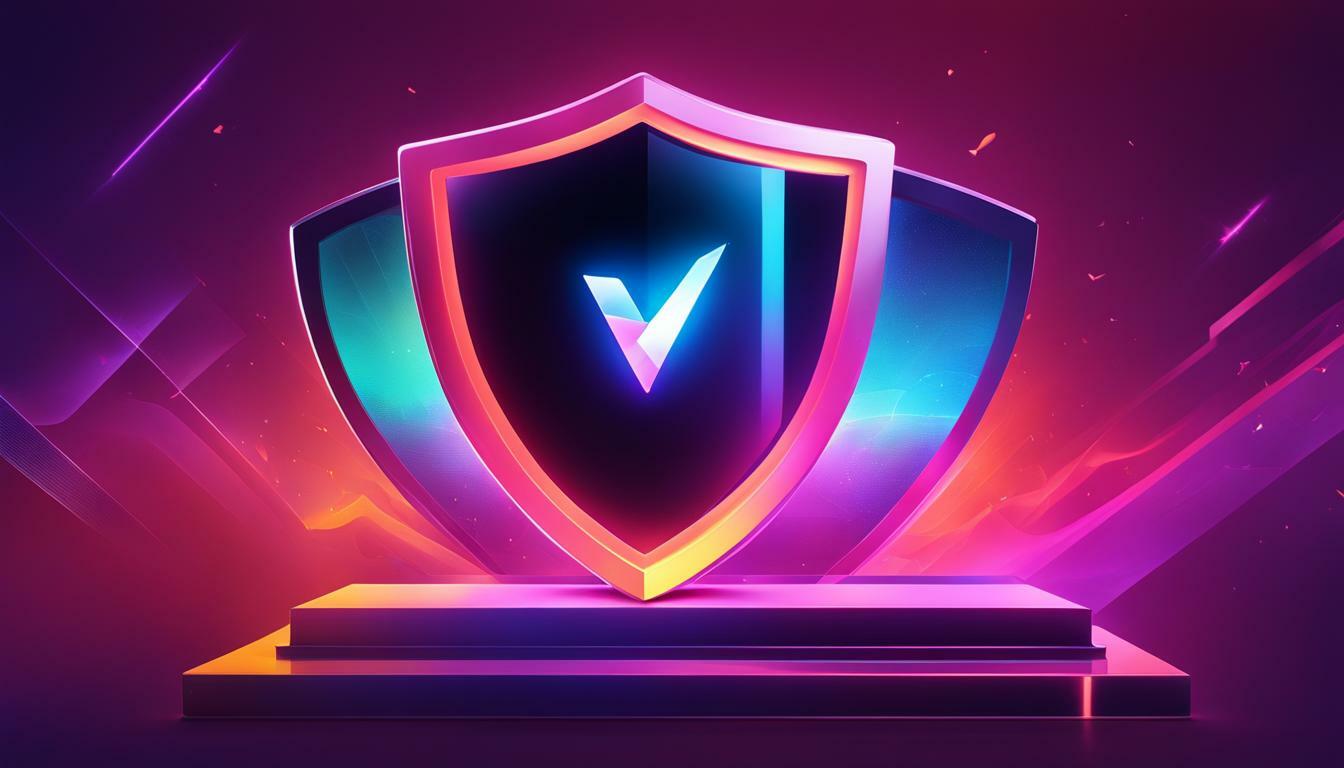If you’re an avid Kodi user or enjoy streaming media players, you’re likely aware of the potential risks that come with online streaming. From prying eyes to restrictive geo-blocks, accessing content can be a challenge. That’s where a Virtual Private Network (VPN) comes in. By using a VPN, you can encrypt your internet connection, mask your IP address, and access content that may be restricted in your area.
In this article, I will provide an overview of the best VPNs for Kodi and other media players. I will discuss the importance of using a VPN to enhance your streaming experience, ensure privacy, and access blocked content. Additionally, I will provide tips on how to set up and configure a VPN for your media player and optimize your VPN settings for seamless streaming.
Key Takeaways:
- A VPN can help enhance your streaming experience and provide privacy when using Kodi and other media players.
- When choosing a VPN for media players, consider factors such as server locations, speed, encryption protocols, and compatibility with your device.
- Optimizing your VPN settings can help improve streaming performance on media players.
- Additional security measures, such as antivirus software and ad-blockers, can further enhance your online security when streaming media.
- By using a VPN, you can access geo-restricted content from anywhere in the world.
What is Kodi and why do you need a VPN for it?
If you’re a fan of streaming media, then you’ve most likely heard of Kodi. This popular media player is free and open-source, making it a go-to choice for many users. With Kodi, you can access a vast library of content, including movies, TV shows, live sports, music, and more.
However, while Kodi itself is completely legal, some third-party add-ons allow users to stream copyrighted content illegally, which can land them in hot water. Additionally, hackers and cybercriminals can easily intercept your online traffic when you’re streaming, potentially exposing sensitive personal information.
That’s why using a VPN for Kodi and other media players is crucial. A VPN provides an encrypted connection between your device and the internet, ensuring that your online activities remain private and secure. With a VPN, you can also access content that may be geo-restricted in your region, allowing you to fully enjoy your streaming experience.
What is a Kodi VPN?
A Kodi VPN is a virtual private network that is specifically designed to work with the Kodi media player. It allows you to connect to servers located in different countries, providing you with a new IP address that makes it appear as if you’re accessing the internet from a different location.
When you use a Kodi VPN, your browsing data is encrypted, ensuring that no one can intercept and read it. This is especially important when using third-party add-ons, which may contain malware or expose your data to hackers.
Why do you need a VPN for streaming media?
A VPN is essential when streaming media because it protects your online privacy and security. When you’re streaming content, your ISP can monitor your online activities and potentially throttle your connection if it detects you’re using a lot of data.
A VPN hides your online traffic from your ISP, ensuring that you can stream without interruption. It also protects your online security by encrypting your data and preventing hackers and cybercriminals from intercepting your traffic.
In summary, a Kodi VPN is a crucial tool for anyone who streams media using Kodi or other media players. It enhances your privacy, security, and access to geo-restricted content, making it an essential tool for any media enthusiast.
How does a VPN work with media players?
A Virtual Private Network (VPN) works by creating a secure and encrypted connection between a user’s device and a VPN server. When a user connects to a VPN server, their internet connection is routed through that server rather than their Internet Service Provider (ISP).
Using a VPN with media players like Kodi ensures that all online activity, including streaming, remains private and protected from prying eyes. This is especially important since ISPs often collect data on their users’ online activities, including the websites they visit and the content they stream.
A VPN for media players creates a secure and encrypted tunnel through which all internet traffic is passed. This ensures that all data, including personal information and streaming activity, is shielded from third-party observation.
How does a VPN work with media players?
When a user connects to a VPN server on their device, the VPN software encrypts all internet traffic flowing in and out of the device. This encrypted traffic is then transmitted through the VPN server and decrypted before being sent to its final destination. The result is a highly secure and private connection that protects the user’s online activities from hackers, cybercriminals, and other snoopers.
When using a VPN for media players like Kodi, the VPN software also ensures that all streaming data is routed through the VPN server. This ensures that the user’s ISP cannot see what they are streaming, preventing any potential throttling or monitoring of their online activity.
Overall, using a VPN for media players is a smart way to ensure online privacy and security while enjoying your favorite content. A secure VPN for media players can help bypass geographic restrictions, prevent ISP monitoring, and protect personal information from data breaches.
Choosing the right VPN for Kodi and other media players
If you are looking for a VPN to use with Kodi or other media players, it’s essential to choose a reliable and secure provider that offers fast and stable connections. Here are some key factors to consider when selecting the best VPN for your streaming needs:
- Server locations: Look for a VPN provider with a large network of servers spread across different countries to ensure that you can access geo-restricted content and maintain fast speeds.
- Encryption protocols: Make sure your VPN uses robust encryption methods such as AES-256 to protect your online activities from prying eyes.
- Speed and performance: Opt for a VPN that offers fast and reliable connections so that you can stream high-quality content without buffering or lag.
- Compatibility: Check that the VPN is compatible with your media player and operating system, such as Windows, Mac, iOS, or Android.
- Customer support: Look for a VPN provider that offers responsive and helpful customer support in case you run into any issues.
By considering these factors, you can ensure that you choose the best VPN for streaming on Kodi or other media players.
Top VPN providers for Kodi and other media players
There are many VPN providers available that claim to be the best for streaming on Kodi or other media players. Here are some of the top VPNs that we recommend:
| VPN Provider | Server Locations | Encryption | Speed | Compatibility |
|---|---|---|---|---|
| NordVPN | 59 countries | AES-256 | Fast | Windows, Mac, iOS, Android, Linux |
| ExpressVPN | 94 countries | AES-256 | Very fast | Windows, Mac, iOS, Android, Linux, routers |
| IPVanish | 55 countries | AES-256 | Fast | Windows, Mac, iOS, Android, Linux, routers |
| Surfshark | 65 countries | AES-256 | Fast | Windows, Mac, iOS, Android, Linux, routers |
These VPN providers have proven to be reliable and efficient for streaming on Kodi and other media players. They offer strong encryption, fast speeds, and compatibility with various devices, making them ideal choices for enhancing your streaming experience.
Key Features to Look for in a VPN for Media Players
When selecting a VPN for Kodi and other media players, it’s important to consider certain features that will ensure you get the best streaming experience. Here are some key features to look for:
Unlimited Bandwidth
The best VPNs for media players offer unlimited bandwidth, allowing you to stream as much content as you want without any restrictions. This is especially important if you plan on streaming high-quality video content, as it can eat up a lot of data.
Strong Encryption
Look for a VPN that uses strong encryption protocols such as AES-256, which offers the highest level of security and protection for your online activities. This ensures that your sensitive information remains private and protected from hackers, ISPs, and government surveillance.
Multiple Device Support
If you plan on using your VPN with multiple devices, make sure to choose a provider that offers multiple device support. This allows you to connect all your devices to the VPN and enjoy secure streaming on each one.
Dedicated Streaming Servers
Some VPNs offer specialized servers optimized for streaming that can enhance your streaming experience by reducing buffering and lag. Look for providers that offer dedicated streaming servers in locations where you want to access content from.
Compatibility
Make sure the VPN you choose is compatible with the device or platform you plan on using it with. Most VPNs support a wide range of devices, including Windows, Mac, iOS, Android, and Linux. Some VPNs also offer browser extensions that allow you to use the VPN directly from your browser.
Customer Support
Finally, make sure to choose a VPN provider that offers excellent customer support. Look for providers that offer 24/7 live chat support, email support, and a detailed knowledge base that can help you troubleshoot any issues you may encounter.
Top VPN providers for Kodi and other media players
Choosing the best VPN for Kodi and other media players is crucial to ensure a seamless streaming experience. Based on my research and personal experience, I have put together a list of the top VPN providers that offer excellent security, speed, and unblocking capabilities for streaming media.
1. ExpressVPN
ExpressVPN is a popular choice for Kodi and other media players due to its fast and reliable connections. It offers 3000+ servers in 94 countries, including dedicated servers for streaming. With military-grade encryption and a strict no-logs policy, ExpressVPN ensures your online activities remain private and secure. It also offers unlimited bandwidth and allows up to 5 simultaneous connections.
2. NordVPN
NordVPN is another top VPN provider suitable for Kodi and other media players. It has a vast server network of 5500+ servers in 59 countries, including dedicated servers for streaming and P2P sharing. NordVPN uses double encryption and has a strict no-logs policy to protect your online activities. It also offers unlimited bandwidth and allows up to 6 simultaneous connections.
3. Surfshark
Surfshark is a newer VPN provider that offers excellent value for money when it comes to Kodi and other media players. It has a growing network of 3200+ servers in 65 countries, including optimized servers for streaming. Surfshark uses strong encryption and offers a strict no-logs policy. It also offers unlimited bandwidth and allows unlimited simultaneous connections, making it an affordable choice for families or households with multiple devices.
4. CyberGhost
CyberGhost is a user-friendly VPN provider that is suitable for beginners and advanced users alike. It offers 6600+ servers in 89 countries, including dedicated servers for streaming and P2P sharing. CyberGhost uses military-grade encryption and has a strict no-logs policy to keep your online activities secure. It also offers unlimited bandwidth and allows up to 7 simultaneous connections.
5. IPVanish
IPVanish is a reliable VPN provider that offers fast and secure connections for Kodi and other media players. It has a network of 1600+ servers in 75+ locations, including servers optimized for streaming and P2P sharing. IPVanish uses 256-bit AES encryption and a strict zero-logs policy to protect your online activities. It also offers unlimited bandwidth and allows up to 10 simultaneous connections, making it great for large households.
No matter which VPN provider you choose, make sure to do your own research and choose one that meets your specific needs for Kodi and other media players. With the right VPN, you can enjoy a seamless streaming experience while protecting your privacy and accessing geo-restricted content.
Setting up and Configuring a VPN for Media Players
Setting up a VPN for your media player may seem daunting, but with the right instructions, it can be a seamless process. Here is a step-by-step guide on how to set up and configure a VPN for use with media players like Kodi.
Step 1: Choose a reliable VPN provider
Before setting up a VPN for your media player, you need to choose a reliable VPN provider that specifically caters to media streaming. Look for providers who offer fast speeds, unlimited bandwidth, and strong encryption. Some popular VPNs for media players include ExpressVPN, NordVPN, and Surfshark.
Step 2: Install the VPN on your device
Once you have chosen a VPN provider, the next step is to install the VPN application on your device. Most VPN providers offer apps for popular devices like Windows, Mac, iOS, and Android. Install the app and log in with your credentials.
Step 3: Connect to a VPN server
After logging in, select a VPN server location that is optimized for streaming. This will provide the best speed and performance for your media player. The VPN app will usually indicate which server location to choose for streaming.
Step 4: Configure the VPN settings
Once connected, configure your VPN settings for streaming. Some VPN providers offer settings that specifically cater to streaming, such as split-tunneling, which allows you to choose which apps to run through the VPN connection. This can help optimize your streaming experience.
It is important to note that not all media players are compatible with VPNs. Check with your media player’s manufacturer to ensure compatibility.
Step 5: Test your VPN connection
After configuring your VPN settings, test your VPN connection to ensure that it is working correctly. Go to a streaming site and check if you can access content that is normally blocked in your region. If it works, then you are all set to start streaming securely with your media player.
Setting up and configuring a VPN for media players is a simple yet effective process that can provide you with privacy and security while streaming. Remember to always choose a reliable VPN provider and optimize your VPN settings for the best streaming experience.
Optimizing VPN Settings for Streaming on Media Players
If you’re using a VPN for streaming media on your media player, it’s important to optimize your settings to ensure a seamless and uninterrupted experience. Here are some tips to help you get the most out of your VPN:
Choose the Right Server
When selecting a server on your VPN, choose one that is located closest to your physical location. This will help improve your connection speed and reduce any lag or buffering issues. If you’re looking to access content that’s restricted to a particular region, choose a server in that location.
Use the Right VPN Protocol
Your VPN may offer different protocols for connecting to their servers. If speed is a priority, opt for protocols like OpenVPN or IKEv2. However, if you’re concerned about security, choose protocols like L2TP/IPSec or SSTP, which offer enhanced encryption.
Turn off Background Applications
When streaming media on your media player, it’s important to minimize the number of background applications running on your device. This will help improve your connection speed and ensure that your media player has sufficient resources to handle the demands of streaming.
Check for VPN Compatibility
Not all media players are compatible with VPNs. Make sure to check if your particular media player is compatible with your VPN before attempting to set up a connection. Some media players may require additional software or settings to work with a VPN.
By following these tips, you can ensure that your VPN connection is optimized for streaming media on your media player. With the right combination of settings and server locations, you can enjoy a seamless and uninterrupted streaming experience, whether you’re watching your favorite shows on Kodi or another media player.
Troubleshooting common issues with VPNs and media players
Using a VPN with your media player can sometimes come with its own set of challenges. Here are some common issues you may encounter and troubleshooting tips to help you resolve them:
Connectivity issues
If you are experiencing connectivity issues with your VPN and media player, try the following:
- Check your internet connection and ensure that it is stable and strong enough to support streaming.
- Restart your device and try connecting to the VPN again.
- Try connecting to a different VPN server or location.
- Contact your VPN provider’s customer support team for assistance.
Compatibility issues
Make sure that your VPN is compatible with your media player. If you are unsure, check your VPN provider’s website for a list of supported devices and platforms.
Performance issues
If your VPN is affecting the performance of your media player, try the following:
- Choose a VPN protocol that is optimized for streaming, such as OpenVPN or IKEv2.
- Select a VPN server location that is closer to your physical location.
- Upgrade to a higher-tier VPN plan with faster speeds and more bandwidth.
- Try using a wired internet connection instead of Wi-Fi to ensure maximum speed and stability.
Buffering issues
If you are experiencing buffering issues while streaming content with your media player and VPN, try the following:
- Choose a VPN server location that is closer to the content’s origin server.
- Disable any other applications or devices that may be using up bandwidth.
- Use a VPN that offers dedicated streaming servers specifically optimized for media players.
- Try adjusting the video quality to a lower resolution to reduce buffering.
By troubleshooting these common issues with your VPN and media player, you can ensure that your streaming experience is seamless, secure, and uninterrupted.
Additional Security Measures to Enhance Your Streaming Experience
While using a VPN for streaming media is a great way to enhance your online privacy, there are additional security measures you can take to further improve your streaming experience.
One effective measure is to install antivirus software on your device. This can help protect you from malware and other online threats that could compromise your security and privacy while streaming.
Another useful tool is an ad-blocker. By blocking ads, you can reduce the risk of encountering malicious ads or pop-ups that could compromise your system or lead to phishing scams.
It’s also important to be cautious when accessing content online. Be wary of websites or sources that appear dubious or offer pirated or copyright-infringing content. Stick to reputable sources and use caution when downloading or streaming content.
By taking these additional security measures, you can further enhance your streaming experience and enjoy a more secure and private online presence.
Conclusion
In conclusion, using a VPN with Kodi and other media players is essential for a safe, secure, and uninterrupted streaming experience. The best VPNs for Kodi and other media players are those that offer strong encryption, fast speeds, and a wide range of server locations. By choosing a VPN that meets these criteria, you can not only access geo-blocked content but also safeguard your privacy from cyber threats and monitoring.
Based on the criteria discussed, ExpressVPN, NordVPN, and CyberGhost VPN are some of the top VPN providers for Kodi and other media players. These VPNs offer excellent security features, fast speeds, and user-friendly interfaces to ensure a seamless streaming experience. They also come with a variety of price plans to suit different budgets.
Setting up a VPN for Kodi and other media players is relatively easy, and configuring the settings for optimal streaming performance is a breeze. However, if you encounter any issues, such as connectivity or buffering problems, the troubleshooting tips discussed can help resolve them.
In addition to using a VPN, it’s essential to take additional security measures such as using antivirus software and avoiding shady websites. These measures can further enhance your streaming experience and keep you safe from malware and other cyber threats.
In summary, the best VPN for Kodi, and other media players is one that offers top-notch security, fast speeds, and a wide range of server locations. By following the steps discussed in this article, you can easily set up and configure a VPN for optimal streaming performance on your media player of choice.
FAQ
Q: What is a VPN?
A: A VPN, or Virtual Private Network, is a technology that creates a secure and encrypted connection between your device and the internet. It allows you to browse the web anonymously and securely, protecting your privacy and sensitive data.
Q: Why do I need a VPN for Kodi and other media players?
A: Using a VPN with Kodi and other media players is important for several reasons. It helps enhance your streaming experience by bypassing geo-restrictions, ensuring privacy by encrypting your internet connection, and protecting against potential threats or hacking attempts.
Q: How does a VPN work with media players like Kodi?
A: When you connect to a VPN server, all your internet traffic is routed through that server. This creates a secure and encrypted tunnel, preventing anyone from monitoring or intercepting your online activities. It masks your real IP address, allowing you to access geo-restricted content and enhancing your privacy.
Q: What should I look for when choosing a VPN for Kodi and other media players?
A: When selecting a VPN for media players, consider factors such as server locations, connection speed, encryption protocols, compatibility with your device, and customer reviews. It’s important to choose a VPN that offers fast and reliable performance, strong security measures, and dedicated streaming servers.
Q: What are the key features to look for in a VPN for media players?
A: Some key features to consider when selecting a VPN for media players include unlimited bandwidth, multiple device support, strong encryption, a large network of servers, and a no-logs policy. These features will ensure a seamless and secure streaming experience.
Q: Which are the top VPN providers for Kodi and other media players?
A: Some of the top VPN providers for Kodi and other media players include ExpressVPN, NordVPN, and CyberGhost. These VPNs offer a combination of excellent performance, strong security, and dedicated streaming features.
Q: How do I set up and configure a VPN for media players?
A: Setting up and configuring a VPN for media players can vary depending on the device and operating system you’re using. However, generally, you need to sign up for a VPN service, download and install the VPN app, choose a server location, and connect to the VPN. Most VPN providers offer helpful setup guides and support to assist you through the process.
Q: How can I optimize VPN settings for streaming on media players?
A: To optimize VPN settings for streaming on media players, you can select a server location closest to your actual location, choose the appropriate VPN protocol for speed and security, and disable any unnecessary features or settings that may impact performance. Additionally, you can try connecting to different servers to find the best performance for your specific needs.
Q: What should I do if I encounter issues with VPNs and media players?
A: If you encounter issues with VPNs and media players, try restarting your device, reconnecting to the VPN server, or changing the VPN protocol. You can also check for any updates for your media player software and VPN app, as well as contact the VPN provider’s customer support for assistance.
Q: Are there any additional security measures I can take to enhance my streaming experience?
A: Yes, in addition to using a VPN, you can take other security measures to enhance your streaming experience. These can include using antivirus software to protect against malware, using ad-blockers to reduce unwanted advertisements, and being cautious of downloading or streaming copyright-infringing content.








